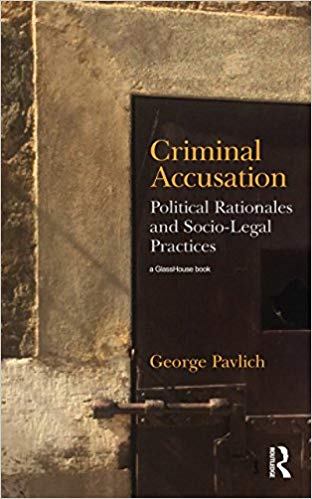Accusing someone of committing a crime arrests everyday social relations and unfurls processes that decide on who to admit to criminal justice networks. Accusation demarcates specific subjects as the criminally accused, who then face courtroom trials, and possible punishment. It inaugurates a crime’s historical journey into being with sanctioned accusers successfully making criminal allegations against accused persons in the presence of authorized juridical agents. Given this decisive role in the production of criminal identities, it is surprising that criminal accusation has received relatively short shrift in sociological, socio-legal and criminological discourses. In this book, George Pavlich redresses this oversight by framing a socio-legal field directed to political rationales and practices of criminal accusation. The focus of its interrogation is the truth-telling powers of an accusatory lore that creates subjects within the confines of socially authorized spaces. And, in this respect, the book has two overarching aims in mind. First, it names and analyses powers of criminal accusation – its history, rationales, rites and effects – as an enduring gateway to criminal justice. Second, the book evaluates the prospects for limiting and/or changing apparatuses of criminal accusation. By understanding their powers, might it be possible to decrease the number who enter criminal justice’s gates? This question opens debate on the subject of the book’s final section: the prospects for more inclusive accusative grammars that do not, as a reflex, turn to exclusionary visions of crime and vengeful, segregated, corrective or risk-orientated punishment. Highlighting how expansive criminal justice systems are populated by accusatorial powers, and how it might be possible to recalibrate the lore that feeds them, this ground-breaking analysis will be of considerable interest to scholars working in socio-legal research studies, critical criminology, social theory, postcolonial studies and critical legal theory.
چکیده فارسی
متهم کردن شخصی به ارتکاب جرم، روابط اجتماعی روزمره را دستگیر می کند و فرآیندهایی را آشکار می کند که تصمیم می گیرد چه کسی را در شبکه های عدالت کیفری پذیرفته شود. اتهام، افراد خاصی را به عنوان متهم جنایی مشخص می کند که سپس با محاکمه در دادگاه و مجازات احتمالی روبرو می شوند. این سفر تاریخی یک جنایت را آغاز می کند تا با متهمان مورد تحریم که با موفقیت در حضور عوامل قضایی مجاز علیه متهمان ادعاهای جنایی مطرح می کنند. با توجه به این نقش تعیین کننده در تولید هویت مجرمانه، جای تعجب است که اتهام جنایی در گفتمان های جامعه شناختی، اجتماعی- حقوقی و جرم شناسی نسبتا کوتاهی داشته است. در این کتاب، جورج پاولیچ این نظارت را با چارچوب بندی یک زمینه اجتماعی-حقوقی معطوف به منطق سیاسی و شیوه های اتهامات جنایی جبران می کند. تمرکز بازجویی آن، قدرت بیان حقیقت یک افسانه اتهامی است که موضوعاتی را در محدوده فضاهای مجاز اجتماعی ایجاد می کند. و از این نظر، کتاب دو هدف کلی را در ذهن دارد. ابتدا، قدرت های اتهام جنایی - تاریخچه، منطق، مناسک و آثار آن - را به عنوان دروازه ای پایدار برای عدالت کیفری نام می برد و تحلیل می کند. دوم، کتاب چشم انداز محدود کردن و/یا تغییر دستگاه های اتهام جنایی را ارزیابی می کند. با درک قدرت آنها، آیا می توان تعداد افرادی که وارد دروازه های عدالت کیفری می شوند کاهش داد؟ این سؤال بحث را در مورد موضوع بخش پایانی کتاب باز می کند: چشم انداز دستور زبان های اتهامی فراگیرتر که به عنوان یک بازتاب به دیدگاه های طردکننده جرم و مجازات انتقام جویانه، جدا شده، اصلاحی یا ریسک محور تبدیل نمی شوند. با تأکید بر اینکه چگونه سیستمهای عدالت کیفری گسترده توسط قدرتهای متهم پر شدهاند، و اینکه چگونه ممکن است بتوان اطلاعاتی را که آنها را تغذیه میکند، مجدداً تنظیم کرد، برای محققانی که در مطالعات تحقیقاتی اجتماعی-حقوقی، جرمشناسی انتقادی، اجتماعی کار میکنند، قابل توجه خواهد بود. نظریه، مطالعات پسااستعماری و نظریه انتقادی حقوقی.
ادامه ...
بستن ...
Ebook details:
عنوان: Criminal Accusation Political Rationales and Socio-Legal Practices (9780367185633)
نویسنده: George Pavlich
ناشر: Routledge; 1 edition (January 5, 2019)
زبان: English
شابک: 0367185636, 978-0367185633
حجم: 3 Mb
فرمت: True Pdf
ادامه ...
بستن ...










